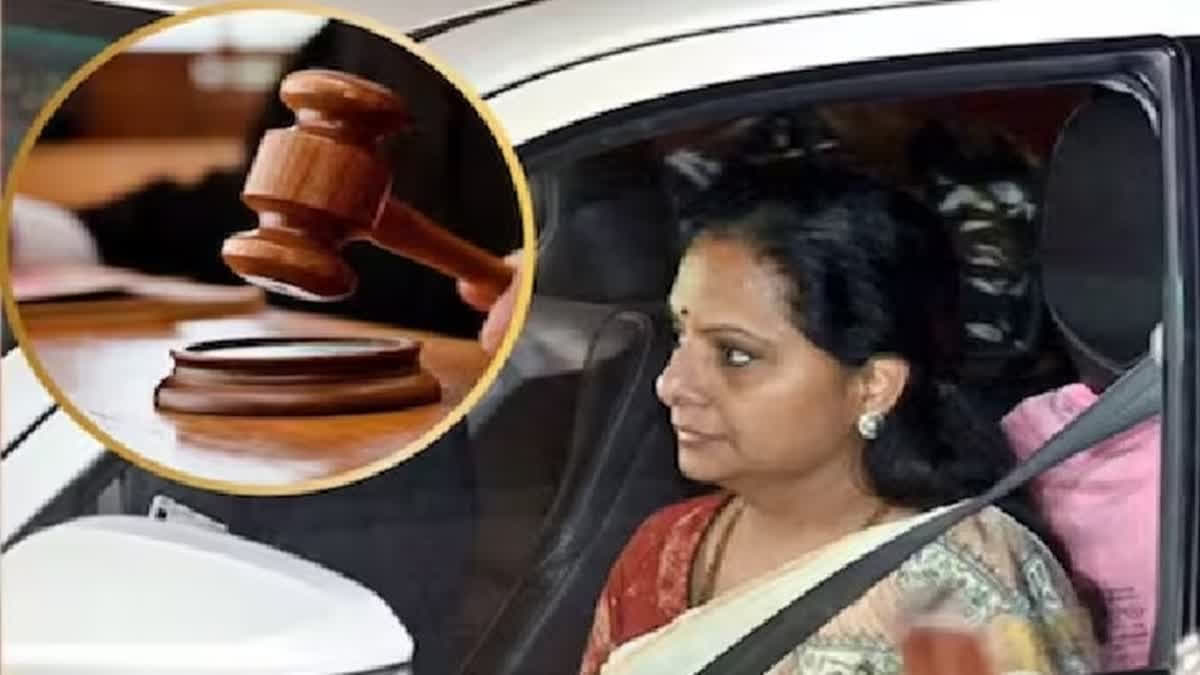New Delhi: The Delhi High Court is scheduled to pass judgment on bail petitions moved by Bharat Rashtra Samithi (BRS) leader K Kavitha in CBI and ED cases related to the Excise Policy case on July 1.
The bench of Justice Swarna Kanta Sharma, after hearing submissions from all sides, decided to reserve the order in the matter on May 28. For K Kavitha, Senior Advocate Vikram Chaudhari and Advocate Nitesh Rana argued in the matter. Advocates Mohit Rao and Deepak Nagar also appeared for K Kavitha.
Advocate DP Singh appeared for the CBI, and Advocate Zoheb Hossain appeared for the Enforcement Directorate. The CBI, while opposing the bail plea, stated that further investigation is at a very crucial stage on certain key aspects, including the involvement of other public servants and private persons as well as the flow of the ill-gotten money. If the accused petitioner is released on bail, there is every likelihood that she will thwart the investigation, more specifically when she fails to meet the 'triple test,' as laid down by the Constitutional Courts in a catena of decisions.
The Enforcement Directorate (ED) also opposed the bail plea and stated that in the case of an offence of money laundering, mere routine conditions that ensure the presence of the accused during the trial or protect the evidence are not enough because of the trans-border nature of the offence and the influence that may be exercised by the accused. An accused can anonymously remove the money trail using the technology available today, making the investigation and trial infructuous.
The Delhi High Court had earlier issued a notice to the Enforcement Directorate and CBI on the bail petitions moved by Bharat Rashtra Samithi (BRS) leader K Kavitha in the money laundering case pertaining to the scrapped Excise policy of Delhi. Recently, the Enforcement Directorate (ED) filed a supplementary prosecution complaint (chargesheet) in the Excise Policy money laundering case in Rouse Avenue Court.
The chargesheet was filed against BRS leader K Kavitha and other accused, namely Chanpreet Singh, Damodar, Prince Singh, and Arvind Kumar. The plea moved by K Kavitha stated that she is the mother of two children, one of whom is a minor presently under shock and undergoing medical supervision. Kavitha, in her fresh bail plea, alleges that there have been attempts to drag her into the scandal by the members of the ruling party at the Centre.
She, through the bail plea, submitted that the entire case of the Enforcement Directorate hinges upon statements made by the approver, witnesses, or co-accused under Section 50 of the PMLA. The Prosecution Complaints do not provide a single document that corroborates the statements. There is not a single piece of evidence that points to the guilt of the Applicant.
She further stated that the arrest of the applicant is illegal as Section 19 of the PMLA has not been complied with. Neither has any corroboration to the allegation of the actual cash transaction nor any money trail is forthcoming, therefore, the satisfaction of guilt as expressed in her Arrest Order is merely a sham and a pretence, she stated.
On May 6, The Rouse Avenue Court of Delhi dismissed the bail petitions moved by Bharatiya Rashtra Samithi (BRS) leader K Kavitha in connection with CBI and ED cases related to the Excise Policy case. BRS leader K Kavitha was arrested by the Enforcement Directorate on March 15, 2024, and by the Central Bureau of Investigation (CBI) on April 11, 2024.
Earlier, CBI, through a remand application, stated that "Kavitha Kalvakuntla was required to be arrested in the instant case to conduct her custodial interrogation for confronting her with the evidence and witnesses to unearth the larger conspiracy hatched among the accused, suspect persons regarding the formulation and implementation of the Excise Policy, as well as to establish the money trail of ill-gotten money generated and to establish the role of other accused/suspect persons, including public servants, as well as to unearth the facts which are in her exclusive knowledge."
The CBI inquiry was recommended based on the findings of the Delhi Chief Secretary's report filed in July showing prima facie violations of the GNCTD Act 1991, Transaction of Business Rules (ToBR)-1993, Delhi Excise Act-2009, and Delhi Excise Rules-2010, officials said. The ED and the CBI had alleged that irregularities were committed while modifying the excise policy, undue favours were extended to license holders, the license fee was waived or reduced, and the L-1 license was extended without the competent authority's approval.
The beneficiaries diverted "illegal" gains to the accused officials and made false entries in their books of account to evade detection, the probe agencies said. As per the allegations, the Excise Department had decided to refund the earnest money deposit of about Rs 30 crore to a successful tenderer against the set rules.
Even though there was no enabling provision, a waiver on tendered license fees was allowed from December 28, 2021, to January 27, 2022, due to COVID-19, the probe agency said, and there was an alleged loss of Rs 144.36 crore to the exchequer.
Read More



